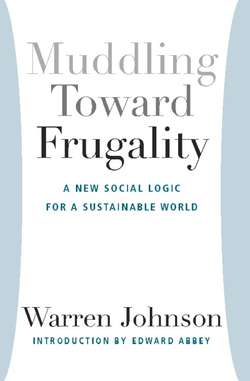Читать книгу Muddling Toward Frugality - Warren Johnson - Страница 17
На сайте Литреса книга снята с продажи.
The Prospects Ahead
ОглавлениеWe have made a great deal of technological and economic progress in the last two centuries, since the Industrial Revolution and the age of colonial empires. In the terms of cultural evolution, however, industrial society is still young and raw. It can be expected to mature, and, with enough time, cultural evolution could do for our society what it did for early agricultural civilization. It could slowly bring about far better ways of utilizing the technology of modern society, ways that have a benign effect on individuals, families, communities, and the environment.
All this is possible if—and this is the rub—enough time is available. Cultural evolution is a slow, halting process. Thousands of years were necessary to transform early agricultural civilizations, with all their exploitations, into the great array of traditional societies that occupied the earth at the start of the age of discovery. We know virtually nothing about the process by which hunters and gatherers built their highly satisfactory way of life, but we do know that they had hundreds of thousands of years for the task, if they needed it. Such spans of time are not available to us. It may be argued that cultural evolution today is much faster, and that we will not need so much time to soften the raw edges of urban industrial society. But the counter-argument can also be made that contemporary changes may not be productive ones, in the evolutionary sense; we may, in fact, be throwing out valuable aspects of our own heritage that are the product of a long evolutionary experience, rather than creating anything that will turn out to be “progress” from the vantage point of the future.
The question of whether modern society is or is not moving in constructive directions is academic; it hardly makes much difference. Whether urban industrial society is advancing or decaying, in the cultural sense, is overshadowed by the fact that in the material sense it has passed its youth. It is now middle-aged and beginning to show signs of old age, and loss of vitality. The resources simply are not available to maintain industrial civilization while the processes of cultural evolution transform it into a rich and satisfying way of life. Our personal feelings about modern life are almost beside the point. Increasingly, the situation regarding resources will determine the shape of the future more than our political, economic, or social aspirations.
